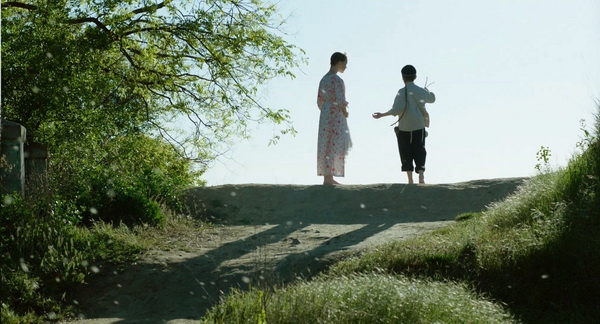Variety опублікувало рецензію на «Пісню Пісень» Єви Нейман
04.08.2015

5 липня 2015 року в рамках головного конкурсу МКФ у Карлових Варах відбулася світова прем'єра драми Єви Нейман «Пісня Пісень». Невдовзі кінокритик Гай Лодж опублікував у одному із провідних світових видань про кіно Variety рецензію на стрічку.
У своєму огляді Гай Лодж зазначає, що виконаний з максимальною точністю до деталей та атмосфери єврейського містечка початку ХХ століття фільм навряд чи матиме комерційний успіх, однак безумовно стане фаворитом фестивалів. Автор підкреслює стриманий характер стрічки, що, зрештою, не йде до кінця сентиментально-елегійним шляхом, заявленим першими кадрами. При тому масова сцена зустрічі героя, що повертається до містечка по довгій перерві, в якій змішано фрагменти діалогів, на думку рецензента, нагадує стиль Роберта Олтмена.
«Усім елементам фільму Єви Нейман приділено надзвичайну увагу. Починаючи від заплямованих брудом декорацій, створених Геннадієм Поповим та Іллею Іову, закінчуючи талановитим підбором акторів Зінаїдою Мамоновою та Тетяною Мурлаковою, завдяки яким дорослішання та трансформації головних героїв показані як ніколи органічно. [Кінооператор Римвідас] Лейпус, в свою чергу, майстерно поєднує натуралістичний та мальовничий стилі, тим самим підкреслюючи нестійкість фантастичного світу, створеного Шимеком, [головним героєм]», – пише Гай Лодж.
Українська прем'єра фільму відбулася 13 липня 2015 року на 6-му Одеському МКФ, де «Пісня Пісень» перемогла одночасно у Міжнародному та Національному конкурсах.
Подаємо оригінал рецензії Гая Лоджа.
Редакція сайту НСКУ
Karlovy Vary Film Review: ‘Song of Songs’
Eva Neymann's delicately rendered third feature examines the blossoming of first love in a Hasidic Jewish shtetl.
Guy Lodge, Variety
An aching nostalgia for a life that never quite existed courses softly through “Song of Songs,” a brief, oblique and rather lovely study of independence asserted and childhood dreams dashed within the Hasidic Jewish community. Tracing the slow-burning near-romance between two young inhabitants of an isolated Ukrainian shtetl at the beginning of the 20th century, Eva Neymann’s lyrical third feature is adapted from multiple texts by celebrated Yiddish writer Sholem Alecheim, with a fragmented, feeling-driven narrative affording ample room for reserved (yet never chilly) cultural observation. Designed and assembled with devoted exactitude, this beguiling excursion into a world seemingly disappearing before its own eyes has minimal commercial potential, but fest programmers — particularly within the faith-specific sector — will gladly sing along.
The opening frames of Neymann’s film set viewers up for a more sentimentally elegiac examination of time and place than the measured one it ultimately delivers: Through the window of a low, rustic cottage, an infant is bathed at once in water and golden candlelight, as a vintage indigenous folk song crackles and pops on an unseen gramophone. (The director has selected a range of vinyl recordings by Jewish artists in lieu of an original score, their weathered aural effect enhancing the pic’s sense of ephemeral cultural presence.) As Rimvydas Leipus’ camera gradually pulls back to offer a snow-flecked tracking tour of the unnamed village, an air of frosty hardship disrupts the chocolate-box glow of that initial impression; “Song of Songs” nests idealized worlds within actual ones like Russian dolls, a little less perfect with each outer layer.
The aforementioned baby is Shimek, the only child of highly conservative, cash-strapped parents; Neymann reveals a caring but constrictive family dynamic through accumulated domestic details and gestures, however minor. (The boy can’t even blow his nose on his own terms.) Skip forward 10 years, and Shimek (played as a youngster by Yevheniy Kogan) has grown into a sensitive, fanciful child, prone to elaborate games of make-believe based on his selective understanding of Kabbalah lore. Scarcely humored by his parents and ossified schoolmaster, he finds a more receptive listener in Buzya (Milena Tsibulskaya), the sweetly solemn, slightly older girl next door. Built on a shared imaginary universe — in which she is a trapped tsarevna (princess) to his courtly rescuer — a deeply felt friendship develops between the two, even as custom forbids them to so much as hold hands.
Viewers, of course, will recognize that the pre-adolescent Shimek is besotted with Buzya well before he does. The extent and endurance of his love for her only reveals itself to him long after he leaves the village, much to his family’s consternation, to study medicine. A vocation many parents wish for their children, it’s instead viewed by Shimek’s as a betrayal of his Orthodox identity; “It is possible to be any scientist and still give God what belongs to God,” he argues via letter. The future of shtetl culture thus hangs in the balance between those like Shimek, who painfully sever their own roots, and those like Buzya, who remain behind. Stricken upon hearing that she is to be married, he returns home for Pesach to make his true feelings known to her.
If the adult Shimek (Arseniy Semenov) and his former community regard each other with mutual skepticism — Neymann employs Altman-esque techniques of overlapping dialogue to convey the village’s claustrophobic conversation mill — his reunion with Buzya (Arina Postolova-Tihipko) is more affectionate. Certain childhood idylls, however, can’t be reconstructed, as the wistful poetry of the pic’s second half navigates the growing chasm between dimensions of reality its young hero once found fluidly adjacent. It’s a universal growing-up study that gains added resonance from the specifically transitory state of the ethnic environment under scrutiny.
No aspect of Neymann’s intimately scaled production feels unconsidered, from the mud-streaked, careworn surfaces of Gennadiy Popov and Ilya Iovu’s production design to remarkably astute casting by Zinaida Mamontova and Tatiana Murlakova — rarely are child-to-adult character transitions achieved with such credible continuity. Leipus’ meticulous lensing artfully blends naturalistic and more painterly compositional styles, underlining Shimek’s own inconstant residence in the realm of fantasy.
Guy Lodge, Variety, 8 липня 2015 року